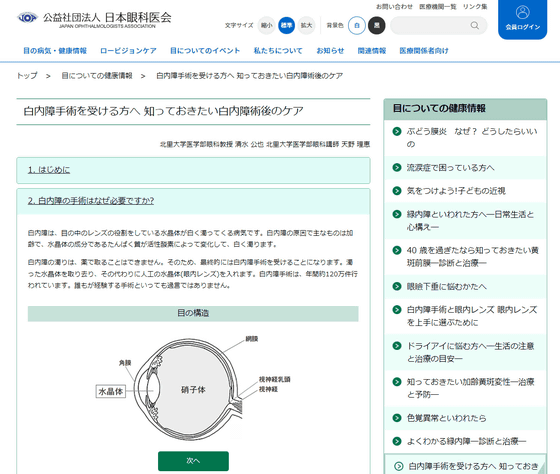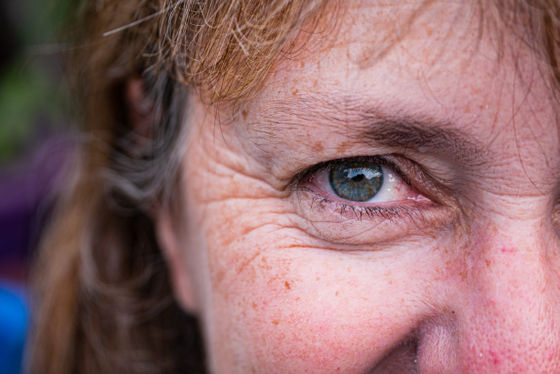Studies show that older people who have had cataract surgery to restore vision are less likely to develop dementia

Regarding the problem of dementia in the elderly, a new study result was announced that 'patients who have undergone cataract surgery to restore their eyesight have a 30% reduction in the incidence of dementia.'
Cataracts and dementia: People who undergo eye surgery have lower risk of brain condition | New Scientist
Cataracts , in which the crystalline lens of the eye becomes cloudy with age, are one of the major causes of vision loss in the elderly. Cataracts are said to affect many people as they age, but the rate of progression varies from person to person, and not all people reach a degree of progression that interferes with their lives. Therefore, the cloudiness of the crystalline lens itself is considered to be a kind of aging phenomenon that is more like spots and wrinkles on the skin than a disease.
In modern times, a surgical method of replacing a cloudy white crystalline lens with an artificial crystalline lens (intraocular lens) is widespread in order to cure cataracts, and about 1.2 million cataract surgeries are performed annually in Japan.
Post-cataract care that you should know for those who undergo cataract surgery | Health information about the eyes | Japan Ophthalmologists Association
https://www.gankaikai.or.jp/health/48/index.html

It is already known that poor vision increases the risk of dementia such as Alzheimer's disease. So Cecilia Lee and colleagues at the University of Washington decided to investigate the effects of cataract surgery, which restores vision, on dementia.
Lee's research team selected subjects aged 65 and over with cataracts or glaucoma from a database of ongoing studies aimed at identifying risk factors for dementia. It was confirmed that the probability of developing dementia decreased by 29% in the span of 8 years for those who underwent cataract treatment surgery, but there was no change in the incidence of dementia in the case of glaucoma treatment surgery. I did.

This study is not a randomized controlled trial, and it is impossible to prove that 'cataract surgery leads to prevention of dementia' because factors such as 'people with dementia are less likely to be recommended for surgery' cannot be excluded. However, because there was no change in the incidence of dementia in glaucoma, Lee et al. Claim that 'cataract surgery has a preventive effect on dementia.'
Lee et al. State that there are two possible theories about the dementia-preventing effect of cataracts. One is that the stimulus obtained from vision prevents aging of the brain, and the other is that 'blue light, which helps regulate the body clock, can be taken in from the eyes again.' Regarding the latter, it is because research results have been reported that when phototherapy, which is exposed to artificial light to improve sleep and depression in sunlight, was applied to patients with mild dementia, their memory and motor abilities improved. 'Cataracts affect the overall quality of light that reaches the retina, such as blue light, so cataract surgery may help reactivate retinal cells and prevent cognitive decline,' said Lee. But there's still a lot we don't understand, 'he declines to say about the mechanism.
Related Posts:
in Science, Posted by darkhorse_log







